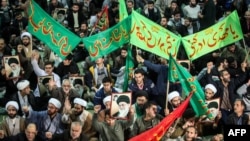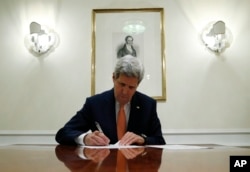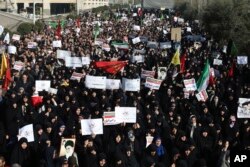President Donald Trump blamed former president Barack Obama Tuesday for "foolishly" giving Iranian leadership money as part of the 2015 nuclear agreement negotiated by his administration, tweeting a claim the funds "went into terrorism and into their pockets."
Trump's tweet recalled the bitter and ongoing political divide over the deal and the U.S. approach to the Islamic Republic, as protests in Iran reached their sixth day on Tuesday. At least 21 people are reported killed in those nationwide protests.
Trump has drawn a clear comparison to Obama's response to the June 2009 Green Revolution, when the former president told reporters "it's up to Iranians to make decisions about who Iran's leaders should be."
Republican critics in Congress said Obama should have been more forceful in support of the Green Revolution, after it was triggered by a presidential election protesters said was fraudulent. Their frustration with the Obama administration's approach to Iran only deepened after the nuclear deal offered Iran relief from economic sanctions in return for concessions on the development of the country's nuclear program.
The deal is now in question after Trump refused to certify it in mid-October, saying "in the event we are not able to reach a working solution with Congress and our allies, then the agreement will be terminated."
The 60-day deadline for Congress to address Trump's refusal to re-certify the deal begins on January 11. But the appetite for scrapping the deal is thin, even among Republicans.
"As flawed as the deal is, I believe we must now enforce the hell out of it," House Foreign Affairs Chairman Rep. Ed Royce said at an October House Foreign Affairs Committee hearing.
Congress could pass legislation that would find a middle ground between Trump's rejection of the deal and the significant consequences of U.S. withdrawal from the agreement. The recent protests are likely to hasten that possibility.
"The protests, however, may increase the incentive for all sides to come together and find a legislative solution," Mark Dubowitz, CEO of the Foundation to Defend Democracies, told VOA. "The protests reinforce the administration's view that the Iranian regime is an odious, expansionist and destructive force in the Middle East."
Additional action?
"If I were Trump, I'd do the exact opposite of Obama," Republican Sen. Lindsey Graham said on CBS's "Face the Nation" news program December 31. "Obama said, 'I don't want to get involved. I don't want to mess up the chance of getting that deal with Iran,'" Graham said.
In a tweet on Tuesday, Graham called on Trump and all those who support freedom to "speak loudly in support of the Iranian people and punish their oppressors to the fullest extent possible."
But for now, most congressional reaction has been limited to broad statements of support for demonstrations of free expression — an approach that could change if the protests develop a clearly defined leadership or set of demands that will require specific policy approaches.
"If Iran has a truly Democratic election, this current regime will be overthrown. Most Iranians want peace, stability, prosperity & freedom," Rep. Lee Zeldin, a Republican from New York who serves on the House Foreign Affairs Committee, tweeted Tuesday.
Retiring Republican U.S. congressman Charlie Dent tweeted support for the people of Iran "in their hour of need. Zealot Iranian rulers must embrace modernity & freedom or suffer the fate of other failed autocrats."
Democratic lawmakers have been relatively quiet in commenting on the Trump administration's approach to the protests. Tim Kaine, a Democratic senator and former running mate of 2016 presidential candidate Hillary Clinton, suggested in a tweet Monday action that would provide immediate assistance to the people of Iran.
Iran is one of eight countries with varying levels of restrictions on immigration imposed by Trump in his executive order banning travel from some Muslim-majority countries.
While the Trump administration is highly unlikely to undertake that action, the prospect for bipartisan cooperation on some aspects of the U.S. approach to Iran remains.
Rep. Will Hurd, a rising new voice in the Republican foreign policy establishment, raised the possibility of sanctioning individuals who abuse the human rights of the protesters.
"Iran is a real threat to the rest of the world. This is something that we can get together as Republicans and Democrats and support and work together on," he said on "Face the Nation" last Sunday. "We should be unified and show the Iranian people we stand with them."






